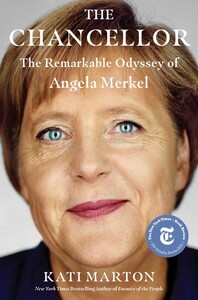You need to sign in or sign up before continuing.
Take a photo of a barcode or cover
The biography was too laudatory and too shallow. It was a fan biography and not a deep analysis.
I've read tons of biographies where the author didn't necessarily have access to the subject directly, but this is the first biography that made me want the full access for some reason. It felt overly clinical and logical, even though the author tried very hard to imagine and/or add a bit of sentiment to it.
Now, this could very well be because the subject, Merkel, knows how to keep her private life private. I'm not sure if there is another book out there about her that has more in-depth look at who she is, that looks past her accomplishments and public facts/information to understand what makes her tick. Marton definitely tried to do that but it felt like speculation most of the time which didn't get me all the excited to be honest. I was expecting more, especially since the author was able to talk to a number of people in Merkel's circle.
That being said, this book makes a great case for all impact and success that Merkel had during her political career, and it brings up great points about her way of doing things and how it differed a lot from the norm at the time. It also highlights her staple policies and major difficulties, giving clear examples and timelines.
I felt like the book was constantly at the surface trying hard to dive deep but only managing to draw conclusions from public data about Merkel without necessarily knowing how or why Merkel functions the way she functions, thinks the way she thinks. Maybe I shouldn't have expected it from a non-official biography. Regardless, it was enough for me to feel like I learned more about her and her way of navigating politics.
Now, this could very well be because the subject, Merkel, knows how to keep her private life private. I'm not sure if there is another book out there about her that has more in-depth look at who she is, that looks past her accomplishments and public facts/information to understand what makes her tick. Marton definitely tried to do that but it felt like speculation most of the time which didn't get me all the excited to be honest. I was expecting more, especially since the author was able to talk to a number of people in Merkel's circle.
That being said, this book makes a great case for all impact and success that Merkel had during her political career, and it brings up great points about her way of doing things and how it differed a lot from the norm at the time. It also highlights her staple policies and major difficulties, giving clear examples and timelines.
I felt like the book was constantly at the surface trying hard to dive deep but only managing to draw conclusions from public data about Merkel without necessarily knowing how or why Merkel functions the way she functions, thinks the way she thinks. Maybe I shouldn't have expected it from a non-official biography. Regardless, it was enough for me to feel like I learned more about her and her way of navigating politics.
informative
inspiring
fast-paced
informative
inspiring
reflective
medium-paced
What a woman. What a leader. With grace and humility Angela Merkel led Germany for 16 years. In that time this greatest believer in America and the western alliance has had to take the lead in moving Europe away from its dependence on the US and toward a future where that US cannot be counted on to always be a good partner.
In the final chapter of the book, the author describes how in the closing days of the trump administration she led negotiations for an EU trade deal with China. In the opening days of the Biden administration she was pressured to slow walk finalization because “America was back.” Merkel moved forward, finalized the agreement, demonstrating in a concrete way that Europe is done being the junior partner of the US. Nothing could better demonstrate the end of the Pax Americanus.
In the final chapter of the book, the author describes how in the closing days of the trump administration she led negotiations for an EU trade deal with China. In the opening days of the Biden administration she was pressured to slow walk finalization because “America was back.” Merkel moved forward, finalized the agreement, demonstrating in a concrete way that Europe is done being the junior partner of the US. Nothing could better demonstrate the end of the Pax Americanus.
challenging
hopeful
informative
inspiring
reflective
fast-paced
Very interesting survey on her life. It is clear that the author admires her, but she isn't shy about talking about the mistakes the Merkel has made throughout her tenure. I read this book very quickly.
A fascinating portrait of one of the most influential leaders of the last 20 years. I walk away with a slightly better understanding of Merkel, and inspired by her example of leadership.
As an admirer of Angela Merkel, I was eager to read Kati Marton's Merkel biography. As I type this review, looking at the book cover, I remain appreciative of this blue eyed, calm looking woman who led Germany for 16 years, and marvel that she does not display physical signs of wear and tear from governance and leadership.
If you want to learn more about this highly private Chancellor, who spent the first 35 years of her life living behind the Iron Curtain in East Germany, this book is a good place to start. Kati Marton will be your tour guide but not your story teller. That remains my biggest issue with this book. Kati's style of writing seems perfectly meshed with Angela Merkel's style of governing. Both are to the point. Neither tells stories to get their points across.
I have read many biographies of prominent leaders, and the very best ones read as stories of history and individuals, not merely as statements of facts.
This made me curious about Kati Marton. Thanks to my neighbor I went in search of interviews with the author, eventually watching this hour talk with Marton and Peter Bergen. While I enjoyed the talk, what now pops to mind is the line associated with the 1950s television show Dragnet: "Just the facts, ma'am."
Nonetheless, I restate my earlier comment: If you want to learn more about this highly private Chancellor, who spent the first 35 years of her life living behind the Iron Curtain in East Germany, this book is a good place to start.
If you want to learn more about this highly private Chancellor, who spent the first 35 years of her life living behind the Iron Curtain in East Germany, this book is a good place to start. Kati Marton will be your tour guide but not your story teller. That remains my biggest issue with this book. Kati's style of writing seems perfectly meshed with Angela Merkel's style of governing. Both are to the point. Neither tells stories to get their points across.
I have read many biographies of prominent leaders, and the very best ones read as stories of history and individuals, not merely as statements of facts.
This made me curious about Kati Marton. Thanks to my neighbor I went in search of interviews with the author, eventually watching this hour talk with Marton and Peter Bergen. While I enjoyed the talk, what now pops to mind is the line associated with the 1950s television show Dragnet: "Just the facts, ma'am."
Nonetheless, I restate my earlier comment: If you want to learn more about this highly private Chancellor, who spent the first 35 years of her life living behind the Iron Curtain in East Germany, this book is a good place to start.
Coming from a German family, I have heard many opinions on the Chancellor’s tenure. I think this book does a great job of covering the majority of her years as a leader and presents the human side of a person who by all accounts has kept her personal life personal.
Living in the U.S., I can say that the priority of living globally is not systemic when it should be given we are a nation built by the rest of the world. I think the Chancellor’s upbringing as well as her decision making in the face of needing to navigate authoritarianism abroad and domestically speaks to the world’s struggle.
There are both problems and solutions that grow beyond physical borders. There are histories of tragedy that reawaken with empowered ignorance. If we fail to acknowledge these realities jointly, opportunities to succeed will be harder to achieve. We are a worldwide sum of our parts and the future of our humanity lies with humanity.
Living in the U.S., I can say that the priority of living globally is not systemic when it should be given we are a nation built by the rest of the world. I think the Chancellor’s upbringing as well as her decision making in the face of needing to navigate authoritarianism abroad and domestically speaks to the world’s struggle.
There are both problems and solutions that grow beyond physical borders. There are histories of tragedy that reawaken with empowered ignorance. If we fail to acknowledge these realities jointly, opportunities to succeed will be harder to achieve. We are a worldwide sum of our parts and the future of our humanity lies with humanity.





